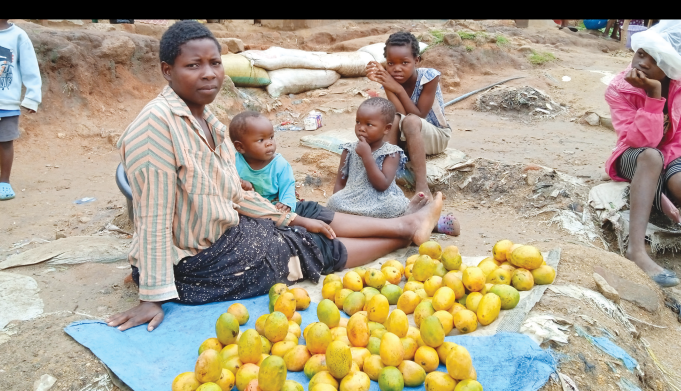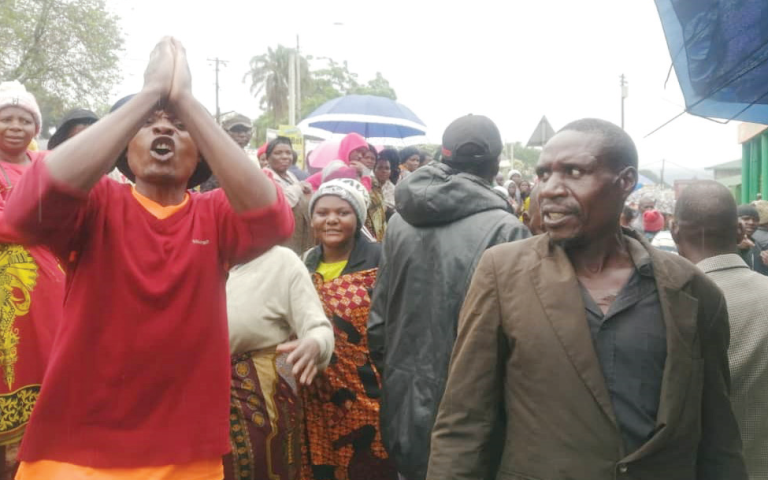With maize out of the reach of poor households, most Malawians are experiencing a starving Christmas today surviving on mangoes and maize husks due to high prices of the staple, Nation on Sunday has established.
A 50-kilogramme (kg) bag of maize is selling between K25 000 and K27 000 in the South and Central regions, and K20 500 in the Northern Region.
Kabangwe sells mangoes in Ndirande Township, Blantyre
These prices are out of reach of most poor people in the country and the closure of the Agricultural Development and Marketing Corporation (Admarc) in August this year, which was set to cushion the prices, has compounded the problem.
Spot interviews nationwide confirmed fears the Malawi Vulnerability Assessment Committee (Mvac) report projected that 3.82 million people, representing 20 percent of Malawi’s population and located in the country’s 27 of the 28 districts, would be food insecure from November 2022 to March 2023.
According to the Catholic Commission for Justice and Peace (CCJP), their recent survey has also confirmed that most people in rural areas are surviving on mangoes.
Pledged to reopen Admarc: Kawale
For instance, Trifonia Kabangwe, a single mother of three from Majiga in Ndirande Township, Blantyre, says she is surviving on mangoes because she cannot afford a bag of maize at the current prices.
She says: “I survive on piecework earning between K700 and K1 500 a day which is not enough for my household.”
On this day, around 10am, Nation on Sunday crew found Kabangwe and her children selling mangoes on the sidewalk, a stone’s throw away from her grass-thatched one bed-room house.
While waiting for customers, she was selecting some green mangoes to prepare for lunch.
Kabangwe boils the mangoes before serving them to her family.
Dressed in a torn khaki striped dress partly revealing her body and a torn wrapper, Kabangwe said hunger has reduced her to a beggar.
She says on rare occasions that she manages to buy a small pack of flour, she prepares meals around 3pm for the family to eat once in a day.
The 31-year-old cannot remember when she had a proper meal in the past month, claiming she lives from hand to mouth.
Sylvia Makina, 34, from Bereu in Chikwawa shares a similar story.
She says she has been living on maize husks since September.
The single mother of four did not harvest enough due tropical storms Ana and Gombe induced floods in January and February this year.
The storms washed away 115 388 hectares of crops in the Southern Region.
“I have to beg for maize husks from one maize mill to another. The millers give me piecework in says Makina.exchange for the maize husks,”
After the two tropical storms, Makina was living at Bereu Primary School in the district where a camp for flood survivors was set up.
Living at the camp meant she was surviving on food and other basic necessities donated by well-wishers.
But this is no longer the case and she has to move from one maize mill to another, begging for the maize husks which most people use for animal feed.
Emmanuel Nkata, 26, who operates a maize mill at Tengani Trading Centre in Nsanje, says during a lean season such as this people and livestock scramble for maize husks.
He says the maize husks are processed into livestock and human food.
A 50kg bag of maize husks is selling between K6 000 and K8 000 due to demand.
Maryam Kunje, 32, from Senior Chief Mponda’s area in Mangochi describes her situation as dire.
She says the mango season has helped her find an alternative food source.
During Chiwanja cha Ayao celebrations on October 22 2022, Senior Chief Mponda claimed that his subjects were surviving on mangoes and pleaded with President Lazarus Chakwera for relief maize.
Ellen Damba, 27, from Balaka says she is failing to cope with the maize prices and goes about begging for food from relatives and friends.
Similar stories were also shared by Judith Tambasile, 33, from Likuni in Lilongwe and Enock Chaima, 29, from Mchinji, who in separate interviews said they were failing to buy maize due to high prices.
“With the little I earn from fritters business, I am struggling to make ends meet. At times, we drink tea and go to bed,” says Chaima, a father of four.
Amid escalating maize prices, Minister of Agriculture Sam Kawale, told Parliament on November 24 2022 that government would reopen Admarc markets on December 1 2022.
Kawale said Admarc will be selling maize at K300 per kg, translating to K15 000 per kg.
Government closed Admarc on August 31 2022 as part of ‘redefining’ functions of the parastatal to serve Malawians better.
But since Wednesday last week, Kawale has been elusive to explain Admarc is still closed amid the escalating maize prices.
The rise in maize prices will significantly affect the country’s inflation, currently at 26.7 percent. The country’s inflation has been increasing largely due to rising food and non-food inflation.
Consumers Association of Malawi (Cama) executive director John Kapito said in an interview on Wednesday that high maize prices have a negative impact on consumers.
He said: “The current market prices of maize are hurting many consumers and we expected the government to respond positively by releasing maize to force vendors to reduce maize prices.”
Kapito said the expectation is that government should deal with matters of maize prices and food scarcity with the utmost urgency it deserves.
CCJP national coordinator Boniface Chibwana said in an interview that Malawi is in a dire situation as regards food security.
“Indeed a CCJP survey in most districts shows that people are surviving on mangoes and if the situation continues without government intervention then we shall soon reach a crisis.
“Inflation on maize prices has reached this far because for a long time we have made Admarc defective and we seem not to have solutions to make it vibrant again,” he said.
Chibwana urged government to flood the market with cheap maize to stabilise the prices.
He said: “In the medium term government should concentrate on mega farms so that we have food sufficiency in the next harvesting season to avoid the repeat of the same.”
He also stressed that distribution of inputs under the AIP should be fast-tracked and elements of corruption should be eliminated so that intended beneficiaries can access fertiliser and seeds.
Department of Disaster management Affairs (Dodma) spokesperson Chipiliro Khamula said in an interview on Thursday that provision of relief assistance to food-insecure households started November 1 2022.
He said Dodma started the exercise with five councils as recommended by Mvac. He said the councils include Balaka, Zomba City and District, Chikwawa and Nsanje.
Khamula said other councils in the Central and South will start benefiting from the programme from January up to March 2023 as per the Mvac report. The Famine Early Warning Systems Network states that despite government and humanitarian partners’ efforts to improve food security through humanitarian food assistance initiatives, the food crisis in Malawi is likely to continue in the short to medium term.
The post Poor households survive on mangoes, maize husks appeared first on The Nation Online.
 Moni Malawi
Moni Malawi 

